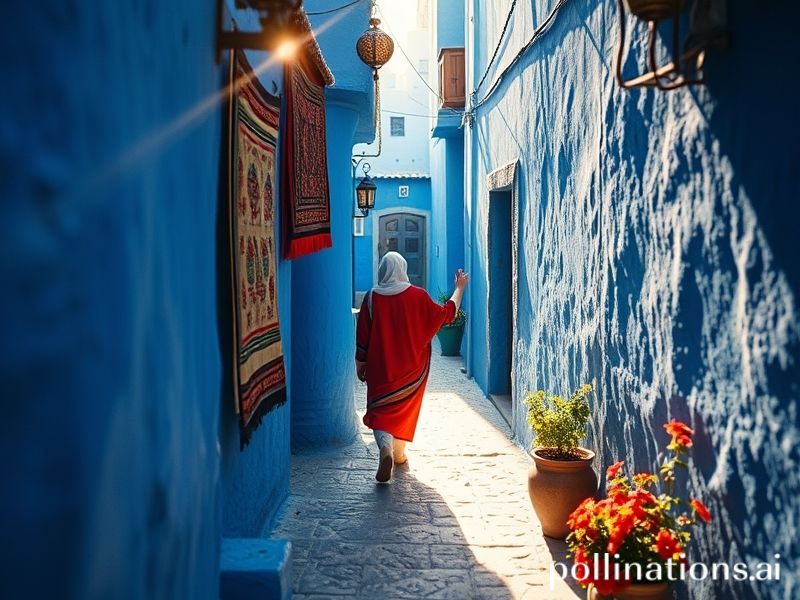Morocco Sells Sunshine, Stability and Selective Amnesia to a Guilt-Ridden Planet
Casablanca—where the air smells of Atlantic salt, diesel exhaust, and the faint but unmistakable perfume of geopolitical compromise. From the rooftop of the downtown Hyatt, you can watch the sun set behind a skyline that looks like Dubai’s younger, thriftier cousin—half-finished glass towers next to tile-roofed medinas, all of it ring-fenced by cranes that never sleep. Morocco, that plucky North-African overachiever, is busy proving you can indeed have your couscous and eat it too, preferably while charging Brussels for the table, Riyadh for the chairs, and Washington for the napkins.
Let us zoom out, dear reader, to the planetary dashboard. Europe is shivering through an energy divorce, China is offshoring its smokestacks, and the United States keeps discovering new continents of domestic dysfunction. Into this vacuum glides Morocco—population 37 million, median age 29, and blessed with more sunshine than a self-help podcast. Rabat’s pitch to the world is elegantly mercenary: we’ll be your solar-panel buddy, your semiconductor subcontractor, and your last reliable ally against irregular migration, all for the low, low cost of pretending not to notice certain human-rights footnotes. Everyone wins, except of course the footnotes.
The numbers are almost indecently attractive. By 2030 the kingdom plans to source 52% of its electricity from renewables, a figure that causes German ministers to fan themselves like overheated debutantes. The Noor Ouarzazate Solar Complex—visible from space, naturally—already lights a million homes and provides Instagram backdrops for every sustainability consultant on LinkedIn. Down the coast at Tanger Med, the fastest-growing port in the Mediterranean, container ships queue like Black Friday shoppers to offload Chinese batteries and pick up phosphate bound for Brazilian soy fields. Somewhere in the background, an IMF economist quietly updates the spreadsheet labeled “countries that might actually hit their NDCs.”
But every success story needs a sinister subplot, and Morocco’s is the disputed territory of Western Sahara, that sandy open-air prison where the coffee is bitter and the hashtags are sponsored. Rabat calls it the “southern provinces”; the Polisario Front calls it home; the United Nations calls it Friday afternoon. Spain, still suffering historical guilt after the 1975 Green March, recently endorsed Morocco’s autonomy plan in exchange for cheaper tomatoes. Donald Trump, never one to miss a branding opportunity, recognized Moroccan sovereignty in exchange—one assumes— for a future golf course. The Sahrawis, meanwhile, continue their hunger strike in the shade of the world’s indifference, a reminder that realpolitik has no calorie count.
Globally, the implications are deliciously transactional. Europe wants Moroccan electrons to meet its 2030 climate targets without installing unsightly turbines in Bavarian backyards. The Gulf monarchies, flush with hydrocarbon cash but nervous about post-oil relevance, are pouring petrodollars into Moroccan green hydrogen projects—think of it as laundering guilt into molecules. Even Israel, fresh from the Abraham Accords, is pitching cybersecurity and drip irrigation to the same government that once sent troops to defend Damascus. If you listen closely, you can hear Henry Kissinger giggling in his grave.
What does this mean for you, the cosmopolitan reader scrolling doom between Zoom calls? Simply that Morocco offers a masterclass in multilateral seduction: a kingdom that quotes the Quran in Arabic, drafts investment laws in French, tweets memes in English, and still manages to mint its own cryptocurrency (the “e-dirham,” because why not). It is simultaneously a buffer state, a green-energy showroom, and a cautionary tale about what happens when liberal democracies outsource their ethics to stable autocracies with good Wi-Fi.
As dusk settles, the call to prayer drifts over Casablanca’s traffic snarls and the city lights flicker on—some powered by Saharan sun, others by Algerian gas routed through Spain with paperwork so creative it deserves a Cannes award. Somewhere in the medina, a teenager live-streams mint-tea tutorials to followers in Jakarta and Milwaukee. The world keeps spinning, the deals keep humming, and Morocco continues its tightrope act across the abyss of modernity, juggling solar panels, phosphate rock, and the occasional human-rights critique like a street performer who knows the hat will always be full as long as the show stays photogenic.
Because in the end, every empire needs a charming concierge—and right now, the uniform fits Rabat perfectly.







